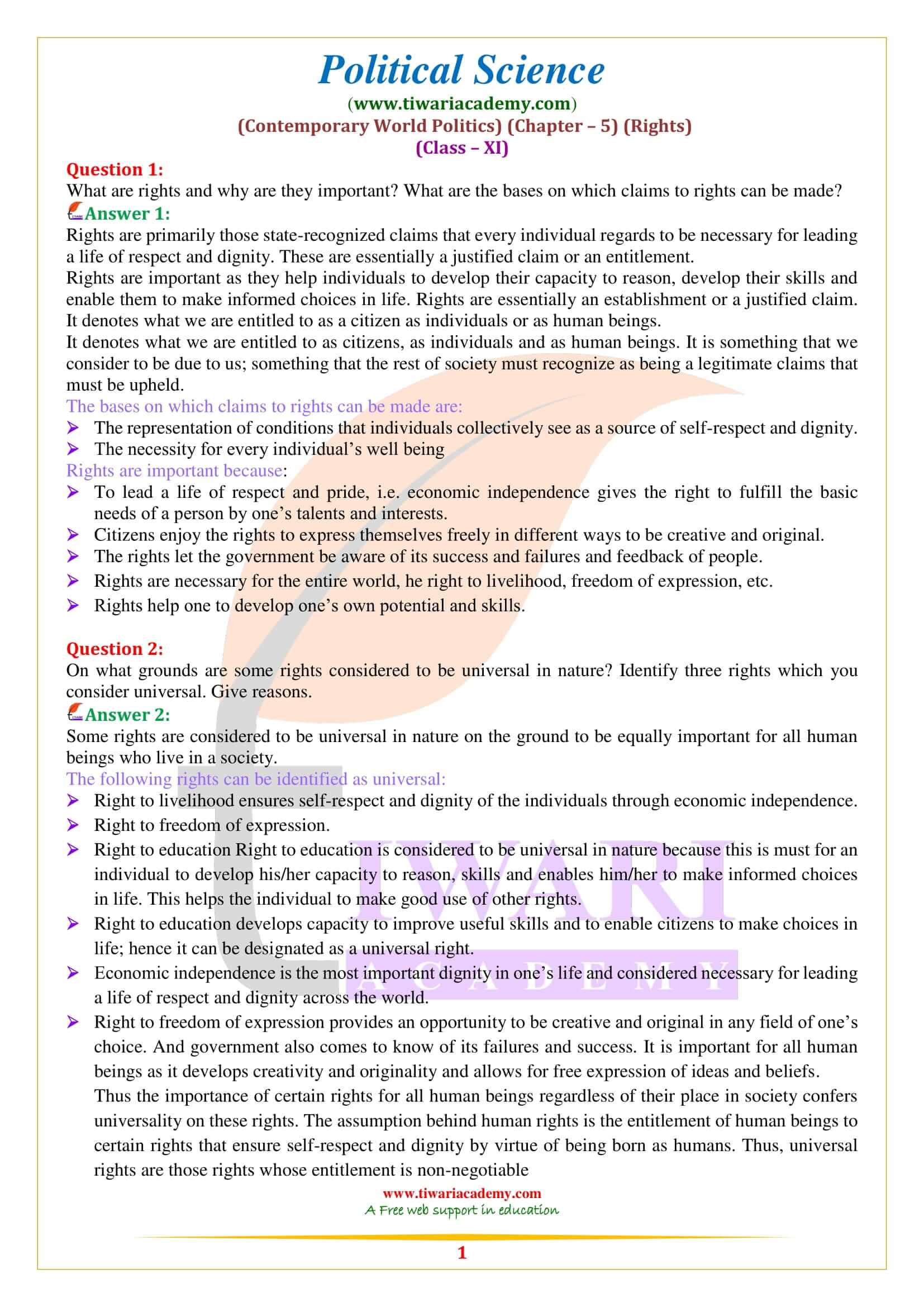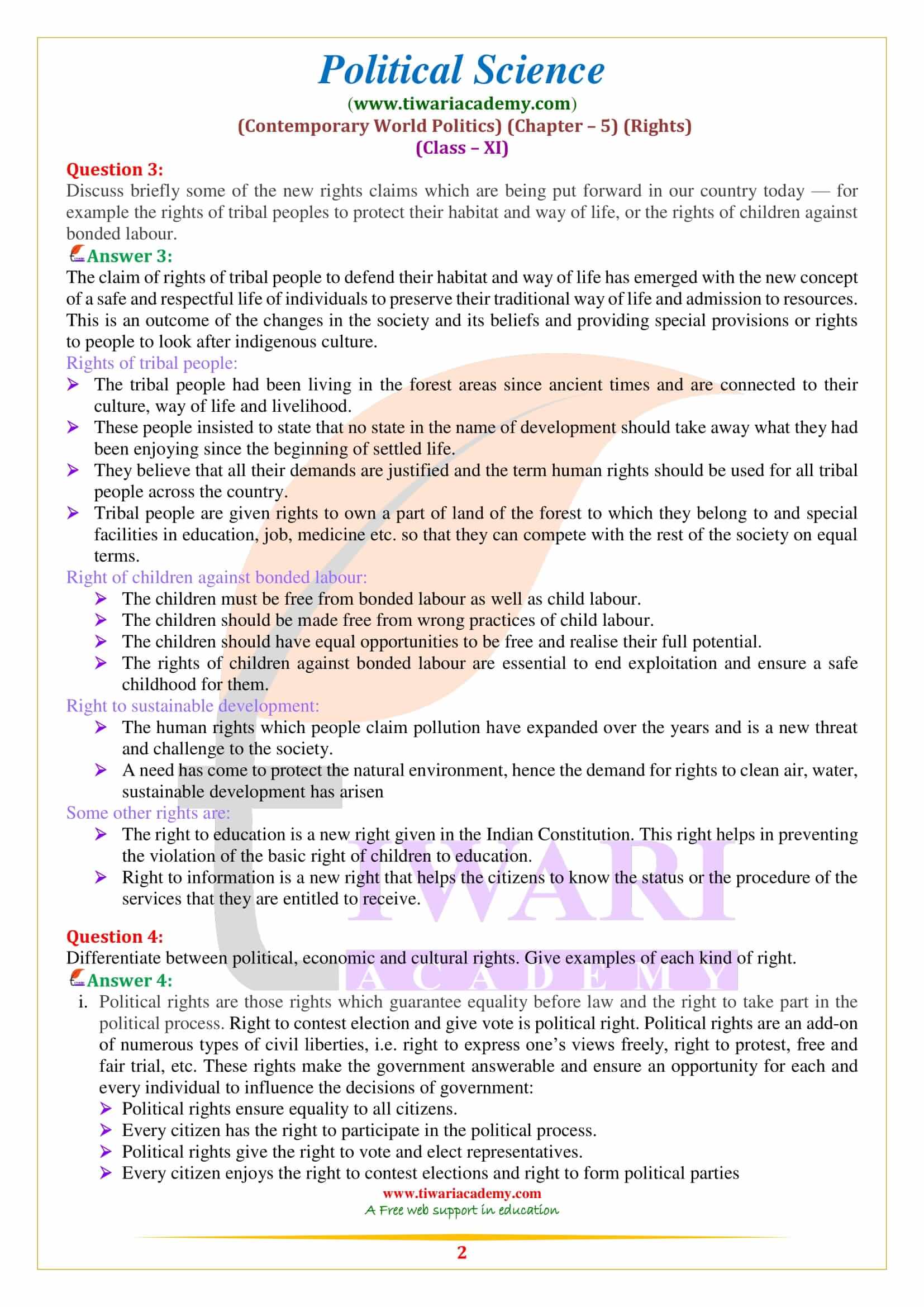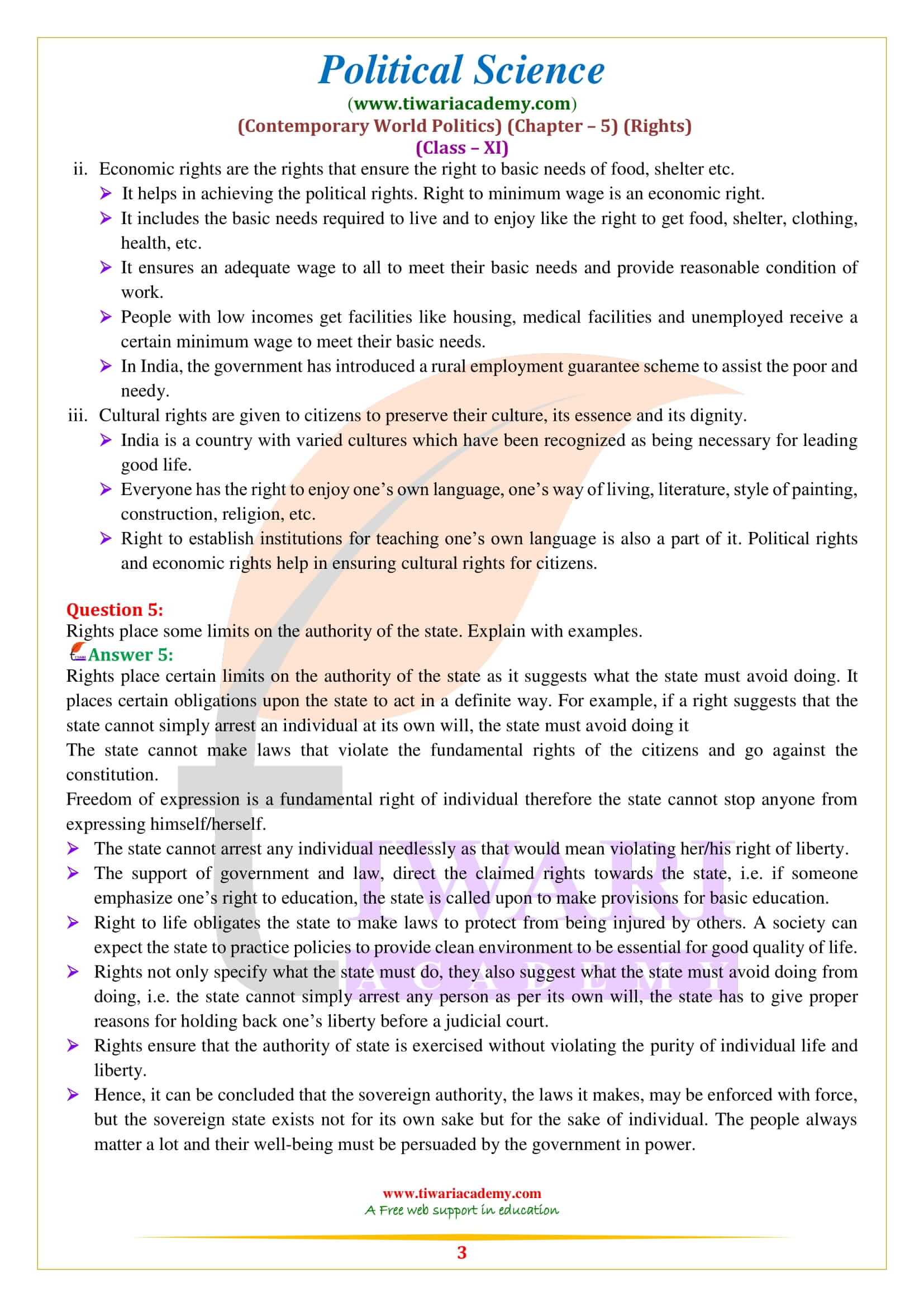NCERT Solutions for Class 11 Political Science Chapter 5 Rights in English and Hindi Medium with all question answers updated for CBSE and State board students session 2024-25. Get important extra questions of Political Theory class 11 Political Science chapter 5 in English Medium.
NCERT Solutions for Class 11 Political Science Chapter 5
What are rights and why are they important? What are the bases on which claims to rights can be made?
Rights are primarily those state-recognized claims that every individual regards to be necessary for leading a life of respect and dignity. These are essentially a justified claim or an entitlement.
Rights are important as they help individuals to develop their capacity to reason, develop their skills and enable them to make informed choices in life. Rights are essentially an establishment or a justified claim. It denotes what we are entitled to as a citizen as individuals or as human beings.
It denotes what we are entitled to as citizens, as individuals and as human beings. It is something that we consider to be due to us; something that the rest of society must recognize as being a legitimate claims that must be upheld.
The bases on which claims to rights can be made are:
- The representation of conditions that individuals collectively see as a source of self-respect and dignity.
- The necessity for every individual’s well being
Rights are important because: - To lead a life of respect and pride, i.e. economic independence gives the right to fulfill the basic needs of a person by one’s talents and interests.
- Citizens enjoy the rights to express themselves freely in different ways to be creative and original.
- The rights let the government be aware of its success and failures and feedback of people.
- Rights are necessary for the entire world, he right to livelihood, freedom of expression, etc.
- Rights help one to develop one’s own potential and skills.
On what grounds are some rights considered to be universal in nature? Identify three rights which you consider universal. Give reasons.
Some rights are considered to be universal in nature on the ground to be equally important for all human beings who live in a society.
The following rights can be identified as universal:
- Right to livelihood ensures self-respect and dignity of the individuals through economic independence.
- Right to freedom of expression.
- Right to education Right to education is considered to be universal in nature because this is must for an individual to develop his/her capacity to reason, skills and enables him/her to make informed choices in life. This helps the individual to make good use of other rights.
- Right to education develops capacity to improve useful skills and to enable citizens to make choices in life; hence it can be designated as a universal right.
- Economic independence is the most important dignity in one’s life and considered necessary for leading a life of respect and dignity across the world.
- Right to freedom of expression provides an opportunity to be creative and original in any field of one’s choice. And government also comes to know of its failures and success. It is important for all human beings as it develops creativity and originality and allows for free expression of ideas and beliefs.
Thus the importance of certain rights for all human beings regardless of their place in society confers universality on these rights. The assumption behind human rights is the entitlement of human beings to certain rights that ensure self-respect and dignity by virtue of being born as humans. Thus, universal rights are those rights whose entitlement is non-negotiable.
Differentiate between political, economic and cultural rights. Give examples of each kind of right.
Political rights are those rights which guarantee equality before law and the right to take part in the political process. Right to contest election and give vote is political right. Political rights are an add-on of numerous types of civil liberties, i.e. right to express one’s views freely, right to protest, free and fair trial, etc. These rights make the government answerable and ensure an opportunity for each and every individual to influence the decisions of government:
- Political rights ensure equality to all citizens.
- Every citizen has the right to participate in the political process.
- Political rights give the right to vote and elect representatives.
- Every citizen enjoys the right to contest elections and right to form political parties.
Economic rights are the rights that ensure the right to basic needs of food, shelter etc.
- It helps in achieving the political rights. Right to minimum wage is an economic right.
- It includes the basic needs required to live and to enjoy like the right to get food, shelter, clothing, health, etc.
- It ensures an adequate wage to all to meet their basic needs and provide reasonable condition of work.
- People with low incomes get facilities like housing, medical facilities and unemployed receive a certain minimum wage to meet their basic needs.
- In India, the government has introduced a rural employment guarantee scheme to assist the poor and needy.
Cultural rights are given to citizens to preserve their culture, its essence and its dignity.
- India is a country with varied cultures which have been recognized as being necessary for leading good life.
- Everyone has the right to enjoy one’s own language, one’s way of living, literature, style of painting, construction, religion, etc.
- Right to establish institutions for teaching one’s own language is also a part of it. Political rights and economic rights help in ensuring cultural rights for citizens.
Rights place some limits on the authority of the state. Explain with examples.
Rights place certain limits on the authority of the state as it suggests what the state must avoid doing. It places certain obligations upon the state to act in a definite way. For example, if a right suggests that the state cannot simply arrest an individual at its own will, the state must avoid doing it.
The state cannot make laws that violate the fundamental rights of the citizens and go against the constitution.
Freedom of expression is a fundamental right of individual therefore the state cannot stop anyone from expressing himself/herself.
- The state cannot arrest any individual needlessly as that would mean violating her/his right of liberty.
- The support of government and law, direct the claimed rights towards the state, i.e. if someone emphasize one’s right to education, the state is called upon to make provisions for basic education.
- Right to life obligates the state to make laws to protect from being injured by others. A society can expect the state to practice policies to provide clean environment to be essential for good quality of life.
- Rights not only specify what the state must do, they also suggest what the state must avoid doing from doing, i.e. the state cannot simply arrest any person as per its own will, the state has to give proper reasons for holding back one’s liberty before a judicial court.
- Rights ensure that the authority of state is exercised without violating the purity of individual life and liberty.
Hence, it can be concluded that the sovereign authority, the laws it makes, may be enforced with force, but the sovereign state exists not for its own sake but for the sake of individual. The people always matter a lot and their well-being must be persuaded by the government in power.





